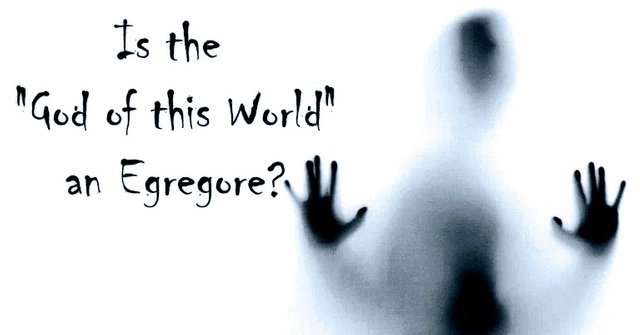Is the 'God of this World' an Egregore?

Egregore (also spelled egregor; from French égrégore, from Ancient Greek egrḗgoros, meaning 'wakeful'): is an occult concept representing a distinct non~physical entity that arises from a collective group of people. Historically, the concept referred to angelic beings, or watchers, and the specific rituals and practices associated with them, namely within Enochian traditions.
More contemporarily, the concept has referred to a psychic manifestation, or thoughtform, occurring when any group shares a common motivation~being made up of, and influencing, the thoughts of the group. The symbiotic relationship between an egregore and its group has been compared to the more recent, non~occult concepts of the corporation (as a juridical person or legal entity) and the meme.
Thoughtform or Tulpa: is a concept in mysticism and the paranormal of a being or object which is created through spiritual or mental powers. It was adapted by 20th~century theosophists from Tibetan sprul~pa (Tibetan: སྤྲུལ་པ་, Wylie: sprulpa) which means 'emanation' or 'manifestation'. Modern practitioners use the term to refer to a type of willed imaginary friend which practitioners consider to be sentient and relatively autonomous.
Collective consciousness, Collective conscience, or collective conscious (French: conscience collective): is the set of shared beliefs, ideas, and moral attitudes which operate as a unifying force within society. In general, it does not refer to the specifically moral conscience, but to a shared understanding of social norms.
Collective unconscious: refers to structures of the unconscious mind which are shared among beings of the same species. It is a term coined by Carl Jung. According to Jung, the human collective unconscious is populated by instincts, as well as by archetypes: universal symbols. Jung considered the collective unconscious to underpin and surround the unconscious mind, distinguishing it from the personal unconscious of Freudian psychoanalysis. He argued that the collective unconscious had profound influence on the lives of individuals, who lived out its symbols and clothed them in meaning through their experiences. The psycho~therapeutic practice of analytical psychology revolves around examining the patient's relationship to the collective unconscious.
Steam: Old English stiemen, stymen 'emit vapor, emit a scent or odor,' from the root of steam. Meaning 'go by steam power' is from 1831. Transitive sense from 1660s, 'to emit as steam;' meaning 'to treat with steam' is from 1798. Slang steam up (transitive) 'make (someone) angry'; He is surely steamed.
Cloud: The modern sense 'rain~cloud, mass of evaporated water visible and suspended in the sky' is a metaphoric extension that begins to appear c. 1300 in southern texts, based on similarity of cumulus clouds and rock masses. The usual Old English word for 'cloud' was weolcan (see welkin). In Middle English, skie also originally meant 'cloud. early 15c., From 1510s as 'to render dim or obscure;' 1590s as 'to overspread with gloom.'
Water memory: Does water have memory? It is possible for water to function as the computer RAM memory storing in its 'brain' every interaction that occurs in its immediate environment?
Leonardo Da Vinci said: 'Water is the driving force of nature'
Water is what unites all mankind and life in general. Our body consists of 60% to 70% water. The planet’s surface is mostly covered by water. Scientists have concluded that some properties of water are unique and can not be explained entirely by the laws of physics. For example, water is the only chemical compound that can exist in three forms: liquid, solid, and gaseous – at the temperatures that our planet naturally has.
Does water have memory?
The unpredictable behavior of water concerned scientists in the 1950s and 1960s. Unable to explain a series of unpleasant incidents such as deaths of scientists and intelligence agents after drinking water, they resulted in a conclusion that initially seemed incredible:
What if water has memory? What if by some unexplained mechanism, it manages to 'save' information, much like a computer?
In the next years, a series of experiments in various countries of the world have shown that water 'recorded' and 'saved' any outside influence. According to the study author Jacques Benveniste and his team of researchers, it 'remembered' anything that happened in its surrounding environment, and anything that came in contact with water left a 'mark' in it. ~ Anna LeMind
Fish just swimming in a fish bowl.
Bob shit in the tank. Well, Fuck Bob! .... ..
To the question in your title, my Magic 8-Ball says:
Hi! I'm a bot, and this answer was posted automatically. Check this post out for more information.